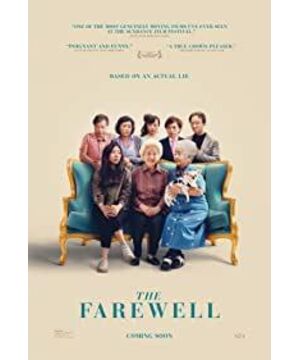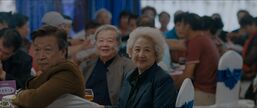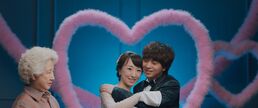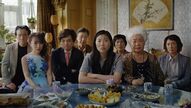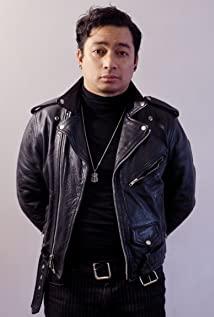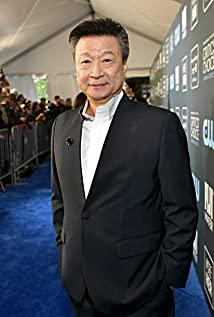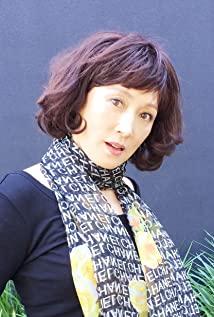【1】
The protagonist in the film is a 30-year-old woman who went abroad at the age of six and can't even speak Chinese. There is no factual basis for long-term relationship with her grandmother. The protagonist's feelings for her grandmother are too exaggerated and unconvincing, and even deliberately pretentious. It is not difficult to see that the author has spent a lot of effort to elevate and beautify himself everywhere. The more it does, the more it means cover-up. In other words, the director's fabricated "unrealistic emotion" towards grandma is just her success. A stepping stone on the road, plays are inherently utilitarian and speculative, and I can't hide the sense of smell of the same creator, so this criticism is relatively harsh, and it doesn't sound good, but in my opinion that's how it is. From the design of some theatrical situations and scenes, as well as the expression of the images, we can see the influence of Chinese-speaking directors such as Ang Lee and Yang Dechang on the author. Their choice of a relatively simple aesthetic style different from that of most American films in their images must be a result. To a certain extent, the innate deficiencies in the play are covered up.
【2】
In general, it's like using a half-truth story to contain a bunch of materials waiting to be edited, and the materials themselves and the means of use have their own advantages and disadvantages. Among them, the relatively good is the main line material, I hope to use the plot to illustrate the coldness of the American "law" and the recognition of the humanitarian concern of "don't tell her" in Chinese culture; however, although the situation of "don't tell her" is in China does, but it does not represent the absolute concept of all Chinese families, and the reality is relatively small. It can only be said that it is easier for Chinese people to understand the family's practices, but it must be reduced that Americans understand it as "China Cancer Hospital" of patients don't even know they're cancer patients because it's a Chinese virtue." In some ways you must not underestimate the country that drinks disinfectant water.
For some other "social image" materials, the materials themselves are basically true, not to mention curious and ugly, and don't need to be too sensitive. In the eyes of the creator, what is not piled up is actually a pile of materials, it depends on how to integrate the materials better. For example, the scenes of the lion warriors and waiters that accompanied the speech at the wedding. Many creators have observed the marginalized people and their situation in some collective activities. This should be art or culture. The "natural attributes" of workers have a certain degree of left-wing perspective. This kind of "society corner" on the scene of the story is properly and cleverly integrated, and it stops at the end, but I hope the director can also show it when he shoots American themes next time. This kind of "sympathy" is not about avoiding important things when you change the world; for cupping cupping like the bathing palace, a few lines are inserted. On the surface, they are talking about family affairs, but in fact they want to roughly express the Chinese way of leisure. , but this way of life is not universally representative in other regions, and the material should be more closely related to the plot, otherwise it will become a pure "display"; the same new real estate outside the car window, the smoke in the street scene when the characters walk and talk The lingering barbecue stalls are relatively natural in combination with the behavior of the characters; some are bizarre, such as giving a shot of passing by the "mahjong room" alone, which has nothing to do with the movie, it makes no sense.
【3】
Second, the use of some "values" materials. For example, if you have also participated in some funerals in your hometown, you have somewhat similar thoughts on the Chinese-style "fake cry". Ming said that all the core relatives have to cry, and not crying will be criticized and questioned about emotions. You even thought about how to use this material, but the author took it before you. However, what is debatable is that it is not difficult to guess that this kind of thinking originally came from the author himself, and the author's autobiographical identity overlaps with the protagonist. Mother seems to be the only "villain" in the film. This is a very contradictory place. First of all, this is a wonderful point of view, but it has become a "step on" at the logical level of the play, resulting in an "emotional response" to people in the end. become vague. Similarly, the comparison of the "social contract spirit" of playing the piano in the church, and whether to "stay in the United States", etc., are also similar, thus creating a "truth that really offends people" and let the "bad guys" say it The strange atmosphere, the protagonist always immediately opposes the "bad guys", is always in the "safe" zone, and never steps on the thunder to offend the Chinese. This kind of "catering" of not stepping on the thunder should come from the author's knowledge of some "Chinese people like to hear But in fact, this so-called "minefield" is just the author's self-righteous one-sided cognition. This short-sightedness comes from the author's "self-protection" when choosing utilitarian The absurd illusion of being familiar with 'face culture'. In other cases, the father eagerly replied, "It's illegal in the United States." How could such a line come from his father's mouth? He is also a member of "Don't tell her" in the story setting. Who should it come from, and who is the most insistent to tell grandma? However, since the father and the grandmother are the mother-son relationship, the degree of "villain" has been reduced to a certain extent, but there are still lines such as "I am American" from time to time.
If the above are all based on the perspective of China, then, from the perspective of the United States, this kind girl is out of love for her grandmother and respect for the Chinese people, and the "villain" mother has become a kind of defender of the American spirit. "Freedom Fighter". For example, topics such as "social contract spirit" and "staying in the United States" involved in the dinner table, arranged a bunch of Chinese relatives for the mother as opposites, showing the conceited and inferior characteristics of "worshiping money" and "worshiping foreign countries". Relatives become a kind of villain, showing the correctness of the mother. The heroine, on the other hand, still repeats her old tricks, jumping out to become the sober and humble person who reflects on the shortcomings of the United States, and also maintains the decency of both parties.
As a result, some rules set by the director in the play can basically emerge, taking advantage of the different cognitive biases in China and the United States, as well as the different emphases in tolerance, in order to achieve [In the eyes of Americans, the two Chinese The American people in 2008 expressed their thinking and the "American Dream" on behalf of American values. The protagonist is kind and simple and "sympathizes" with China; in the eyes of the Chinese, those "bad words" are all spoken by "banana people", and the protagonist stands by us. This side also promotes the purpose of Chinese virtues, and then realizes the will of "no offense on both sides", and the words to be said are all through the mouths of others, and they will retreat. Therefore, we can glimpse the potential contradictions caused by the impure motives of the director in his creation.
This kind of hometown theme is not uncommon, and most of the successful works are shot backwards, first expressing the relative unfamiliarity or alienation of relatives due to long-term separation, and then having to stay for some reason, and then get to know some people or To deal with certain things, through this passive "visit" type experience, to lead "exploration", and change the cognition of the protagonist, showing a process of deep understanding by not knowing. You can shoot uncivilized things, and frankly speaking, this is a kind of objectivity, but through these appearances, what you ultimately want to express is the deepest and most sublime things hidden at the spiritual core level. The subtext is "I am far away. Although there are still many shortcomings in the split slope and chop bird, I found that I love them and the land" and so on. The author has probably touched this side. Although the main line has established a similar clear goal, the process of realizing it, the logic is all wrong, and the intentions are too much to show dishonesty. I haven't seen each other for hundreds of years and there is no reason why I can't leave you. This level of "intimacy" will mislead the judgment of watching movies - if you are so close, you must know very well, which will lead to the premature death of "exploration" or the inability to "explore". The risk of execution, the process becomes meaningless. Then a series of behaviors in the film are all active, so this unfounded cause cannot support the motivation. Fragmented and fancy social images are also very limited in expressing face-to-face reality, and superficial displays will not play the role of "social investigation" that is helpful for reflection, and it is far removed from the search for the root of cultural soil. , but the excessive accumulation reveals the strong intention to advertise himself as a "thinker", and even leads to the question of "whether the author is sarcastic". All of the above lead to a conflicting or confusing emotional response in many places.
Of course, there are also works that have deep feelings for relatives who haven't seen each other for a long time. The protagonist's heart is like an arrow, but such works often include a death conspiracy and the protagonist's revenge, but I think this should not be what the author wants to express Thing, although her grandmother also practiced the exercises, she was not called Huo Yuanjia after all.
View more about The Farewell reviews


